Press releases
Government to provide budget loan with a view to completing work on extension of ANPP Second Power Unit’s operations
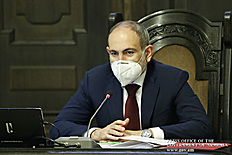 1670x1113px - 390 Kb
1670x1113px - 390 Kb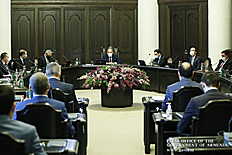 1670x1113px - 483 Kb
1670x1113px - 483 Kb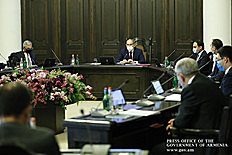 1670x1113px - 438 Kb
1670x1113px - 438 Kb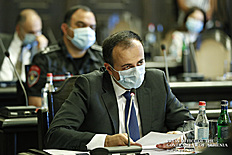 1670x1113px - 428 Kb
1670x1113px - 428 Kb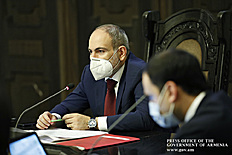 1670x1113px - 356 Kb
1670x1113px - 356 Kb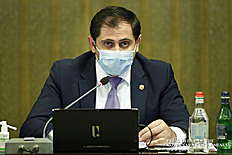 1670x1113px - 384 Kb
1670x1113px - 384 Kb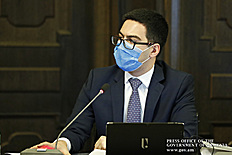 1670x1113px - 345 Kb
1670x1113px - 345 Kb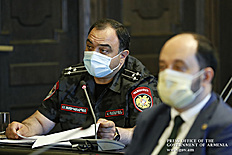 1670x1113px - 405 Kb
1670x1113px - 405 Kb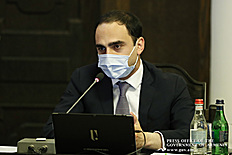 1670x1113px - 308 Kb
1670x1113px - 308 Kb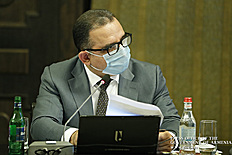 1670x1113px - 395 Kb
1670x1113px - 395 Kb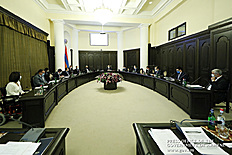 1670x1113px - 515 Kb
1670x1113px - 515 Kb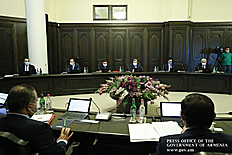 1670x1113px - 477 Kb
1670x1113px - 477 Kb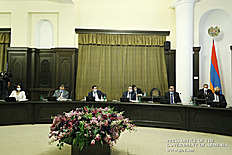 1670x1113px - 502 Kb
1670x1113px - 502 Kb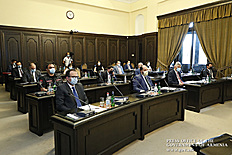 1670x1113px - 591 Kb
1670x1113px - 591 Kb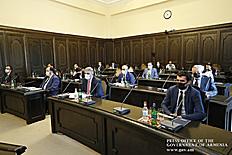 1670x1113px - 565 Kb
1670x1113px - 565 Kb
more 12 photos
A Cabinet meeting was held today, chaired by Prime Minister Nikol Pashinyan.
The Government made a decision with a view to completing work on extension of ANPP Second Power Unit’s operations. Under the Extension of ANPP Second Power Unit’s Operations Program, a cooperation agreement was signed between the governments of the Republic of Armenia and the Russian Federation on December 20, 2014, followed by a loan arrangement signed on February 5, 2015 (USD 300 million in total, of which USD 270 million in the form of a loan, and USD 30 million – as a grant). Minister of Territorial Administration and Infrastructure Suren Papikyan noted that negotiations on extending the loan had started as early as in December, 2018.
“First of all, we need to extend the loan deadline, as it was impossible to spend all the proceeds of the loan. The remaining balance is USD 107 million at this point of time, but in order to bring to completion the ongoing activities, we consider it more expedient to draw on Armenia's internal resources,” the Minister said.
To complete the program, the customer will be provided a state loan of 63.2 billion drams in 2020-2022: 18.7 billion drams will be disbursed in 2020, 31.5 billion - in 2021, and 13 billion - in 2022.
Prime Minister Nikol Pashinyan noted that the existing loan to this day in terms of volumes and conditions is not so convenient for organizing the further activities of the ANPP. “We are giving up part of the loan. Instead, we will raise funds from domestic sources on better terms, which will undoubtedly strengthen the Government's leverage to increase efficiency in the use of borrowed funds. Under the previous terms, we faced specific restrictions, including the procurements. In this case, the procurement process will be carried out according to the market rationale and on a competitive basis, which implies lower cost of purchases. We hope that at least the goods so procured will not be inferior in quality to the previous ones,” the Prime Minister said.
The meeting approved the Government’s legislative initiative on the following bills: On Amending the Law of the Republic of Armenia “On State Registration of Rights to Real Estate,” On Amending the Law of the Republic of Armenia “On Notary Services” and On Amending the Law of the Republic of Armenia “On State Duties.” The need for the above amendments proceeds from the law enforcement practice as stipulated in the corresponding decision of the Constitutional Court. In particular, a change in notary functions is envisaged: notaries can henceforth send a notarized transaction to the cadastre. This function is set as an action based on the notary’s obligations. Thus, people can now use the one-stop-shop facility while concluding a transaction and having it registered with the Committee of Real Estate Cadastre.
A set of draft laws on amending the Subsoil Code of the Republic of Armenia and related laws was approved with a view to ensuring a rational and efficient use of mineral resources. The amendments suggest ruling out the practice of dividing ore deposits in sections. It is also proposed to reduce the provision of the right to operate from 50 years for metal deposits to 25, and non-metal mines to 15 years. The bills address the legislative gaps concerning the right to suspend the exploitation of mineral deposits.
The Government has set a maximum monthly and annual volume of electronic messages sent by the same user registered in a specially designed government system (mobile application) about the same vehicle, and a list of offences that can be reported through the mobile application. The decision provides that one user can send no more than 3 messages about one vehicle per month and no more than 30 messages per year. The mobile application will be available for permanent residents of the Republic of Armenia. Using the application, it will be possible to register the 12 most common types of road traffic offenses, such as entering the oncoming lane, violating parking rules, driving in a red light, throwing garbage out of a car, etc.